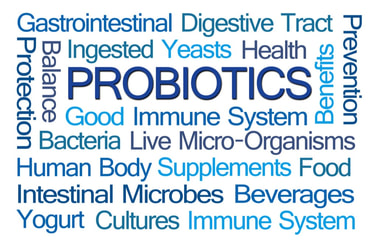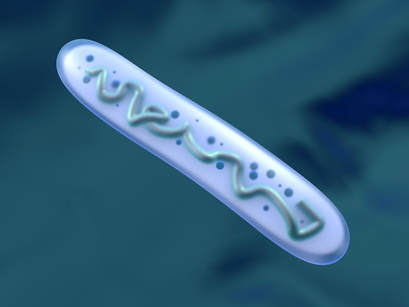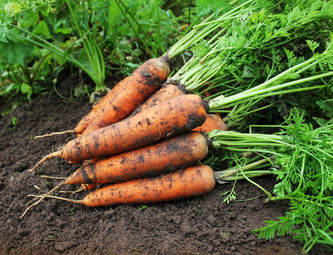The word "probiotic" is thrown around everywhere. What are they, really? The literal definition of probiotic is pro-life. In terms of how probiotics are applicable to us, they are living organisms that are beneficial to health when administered in appropriate doses. Probiotics are the same bacteria as the beneficial bacteria in our gut. Because of exposure to antibiotics, anti-bacterial soaps, and poor diet, most of us have fewer beneficial bacteria in our guts than we need. So how are the different probiotics, or gut bacteria beneficial?There are four major types of probiotics widely available: Lactobacillus, Bifidobacterium, soil based bacteria, and spore forming bacteria. Of the four types, there are many different strains that are beneficial depending on your individual gut microbiome. Lactic Acid Bacteria 3D rendered Illustration of a Lactobacillus Bacteria 3D rendered Illustration of a Lactobacillus Bacteria Lactobacillus and Bifidobacterium are known as lactic acid bacteria, so I'll group them together. They produce lactic acid by eating lactose, sugar, and carbohydrates. They are found mostly in the small intestine and upper GI tract and are the bacteria that ferment our food. Some foods can naturally be fermented with lactic acid bacteria. Examples are yogurt, milk, and cod liver oil. Lactic acid bacteria also:
Lactic acid bacteria are transitory, meaning they move through the digestive system and don't colonize. This means that we need to be ingesting lactic acid bacteria on a regular basis. Fermented foods and probiotics have been part of many cultures for a long time. Soil-Based Bacteria and Spore-Forming Bacteria Soil-based bacteria are naturally found in the soil. They should be on our foods, helping us to digest them. Soil-based bacteria in soil help plants grow better and increase the nutrient content of produce. Because of both modern agricultural methods that practically sterilize the soil and the sanitizing techniques used on produce before it goes to market, we often aren't exposed to soil-based bacteria like we should be. The best ways to be exposed to these bacteria are either to grow your own vegetables or purchase them from your local farmer's market or CSA (community supported agriculture). Soil-based bacteria:
 If you grew up in an urban area, or didn't have access to "dirt" to play in, you may have missed out on some of the beneficial soil-based bacteria. Being exposed, especially during childhood, to a wide range of bacteria in soil, appears to help build a healthy immune system and reduce allergies. Some soil-based bacteria are transitory and others live in our guts. Both types enhance the immune system. Soil-based bacteria can be supplemented, but another option is to get into the garden, grow some vegetables and get your hands dirty. Spore-forming bacteria can survive in just about any environment and can grow rapidly. They can even survive antibiotics. The important distinction is that some soil based bacteria can be spore-forming bacteria, but not all spore forming bacteria are soil-based. Very confusing. Bacillus subtitles is an example of a soil-based bacteria that's also spore forming. It's commonly found in probiotic supplements. Spore-forming bacteria are more likely to live in your gut and can remain dormant for a long time. They revive themselves when the right nutrients are present, which is why if you're supplementing them, you should take them with food. When spore-forming bacteria have been activated, they make it their job to clean up the gut, weeding out the non-beneficial bacteria. Spore-forming bacteria are more likely to make it to the lower digestive tract and set up camp. One Strain of Yeast Deserves an Honorable MentionSaccharomyces boulardii, is one yeast strain that has been shown to be probiotic. It has shown some success in preventing recurring Clostidium difficile, which is a condition of chronic diarrhea. It's the only yeast so far that is being considered a probiotic. It is also being researched as a possible immunobiotic. You've learned about the different types of probiotics: Lactobacillus and Bifidobacterium, that eat lactic acid and are transient; soil-based bacteria and spore-forming bacteria, that survive the harsh conditions of the gut to live there and help sweep out bad bacteria; and the star yeast, Saccharomyces boulardii. I'll continue next week with more information about taking probiotics in supplement form. I'll also debunk some probiotic myths and dive deeper into which types of probiotic supplements might be right for you! * I would like to note that if you think you may have Small Intestine Bacterial Overgrowth (SIBO) or are immune compromised, you should not take probiotics at this time. Did you get to play in the dirt as a kid? Do you get to play in the dirt now? Share your experience in the comments below!
2 Comments
4/2/2018 08:36:30 pm
Very interested in emails on digestive health probiotics in gut foods heal gut from C Diff thank you
Reply
Crystal Obregon
4/3/2018 07:51:22 am
Thank you for your comment, Terri. I came across something recently about healing from C diff. When I figure out where it was I'll let you know.
Reply
Leave a Reply. |
Click below to join my FREE Facebook Group-
Women's Wellness Circle: Create Your Extraordinary Life AuthorHi, I’m Crystal! If you'd like to access my Farmer's Market Friday posts from 2018, click here!
Categories
All
|


 RSS Feed
RSS Feed